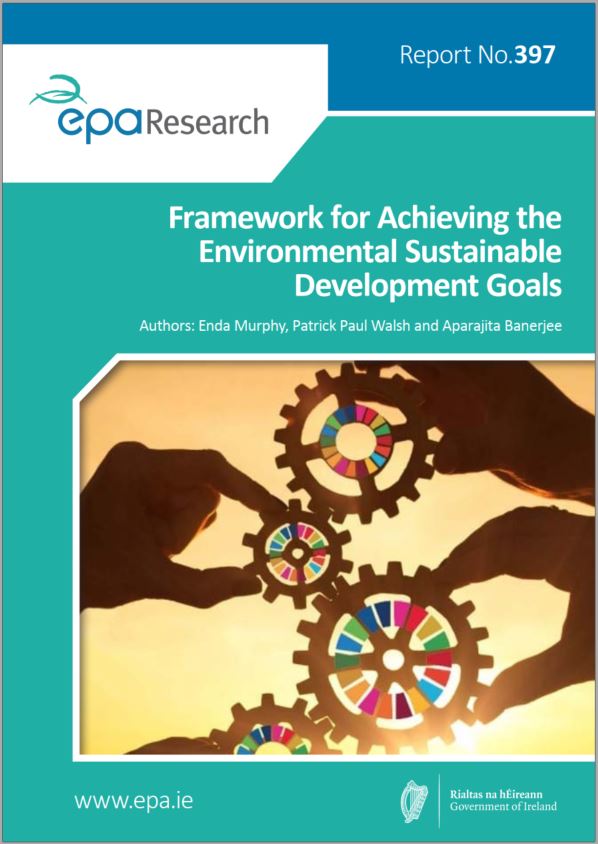Authors: Enda Murphy, Patrick Paul Walsh and Aparajita Banerjee
Summary: This report contributes to a range of international and national policy areas, creating a positive feedback loop between policies for environmental SDG promotion, governance for the SDGs and integrated environmental policymaking. It provides an important evidence base for assessing national progress on the environmental SDGs relative to EU peer nations. This is the first time that Ireland’s progress on the SDGs has been assessed on an SDG target and indicator basis relative to peer nations.

Watch the project highlights video
Ireland is at a critical point in delivering on its United Nations (UN) Sustainable Development Goal (SDG) commitments. However, significant gaps exist in the literature on our understanding of Ireland’s current environmental status in relation to the SDGs. There is a lack of knowledge on the scale of the sustainability problem in Ireland and it is therefore difficult to ensure meaningful improvements in a fully integrated approach to sustainable development. In this regard, there is significant pressure to improve our understanding and assessment of Ireland’s sustainability performance relative to peers in the EU and internationally. This can be achieved with better data and metrics to assess performance on individual SDG targets. In addition, improving our understanding of how partnerships (and specifically multi-stakeholder partnerships) can facilitate whole-of-society transformations for sustainable development is crucial to future sustainability efforts. These gaps are addressed by the research within this report.
This report contributes to a range of international and national policy areas, creating a positive feedback loop between policies for environmental SDG promotion, governance for the SDGs and integrated environmental policymaking. Internationally, the research supports Ireland’s future Voluntary National Review (VNR) at the UN, given its development of an environmental SDG index for Ireland based on the official UN SDG indicator framework. The research is also aligned with the new directorate established within the Irish Central Statistics Office (CSO) in early 2017; the CSO has responsibility for the co-ordination of data collection across government departments for the SDGs. Separately, the research provides a basis for understanding the future role of partnerships for SDGs in SDG transitions and transformations. Moreover, it has important implications for Ireland’s future National Stakeholder Forum and wider stakeholder engagement for delivering on the SDGs.
This research provides an important evidence base for assessing national progress on the environmental SDGs relative to EU peer nations. This is the first time that Ireland’s progress on the SDGs has been assessed on an SDG target and indicator basis relative to peer nations. This is important because it provides a framework to understand Ireland’s strengths and weaknesses on delivering on each individual SDG indicator and target, allowing for the possibility of bespoke policy interventions to address shortcomings. It also allows us to learn from peer nations that have comparably high-performance levels. In this regard, the research has developed the first target-based SDG index of its kind internationally; it is disaggregated on the basis of SDGs means of implementation, outcomes and linkages. In relation to partnerships, the research identifies the lack of existing multi-stakeholder partnerships in Ireland and the need for policy to pursue state-led multi-stakeholder partnerships for future sustainable development.
https://www.epa.ie/media/epa-2020/research/epa-funded-research/Report-cover-397.jpg